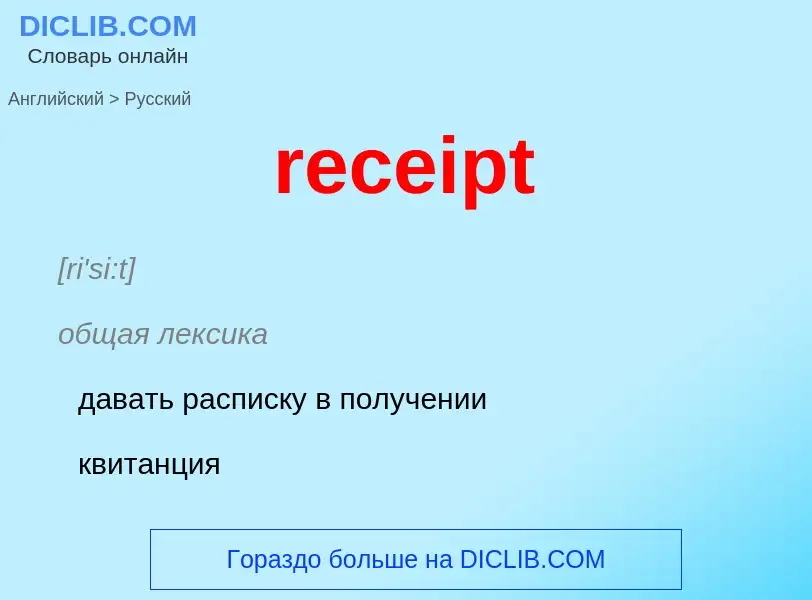Перевод и анализ слов искусственным интеллектом ChatGPT
На этой странице Вы можете получить подробный анализ слова или словосочетания, произведенный с помощью лучшей на сегодняшний день технологии искусственного интеллекта:
- как употребляется слово
- частота употребления
- используется оно чаще в устной или письменной речи
- варианты перевода слова
- примеры употребления (несколько фраз с переводом)
- этимология
receipt - перевод на Английский
[ri'si:t]
общая лексика
давать расписку в получении
квитанция
получение
поступление
приход
расписка в получении
нефтегазовая промышленность
площадка для приёмки, осмотра и технического обслуживания
Смотрите также
существительное
[ri'si:t]
общая лексика
получение (чего-л.)
рецепт (особ. кулинарный)
средство для достижения какой-л. цели
средство для излечения
бухгалтерский учет
расписка
квитанция
расписка в получении (письменное подтверждение уплаты долга или другой операции; в праве является одним из видов письменных доказательств, в некоторых случаях свидетельствует о заключении договора; в учете является документом, подтверждающим происхождение события (хозяйственной операции) (напр. отчет о поступлении товара, счет на оплату и т. п.))
экономика
денежные поступления
выручка
приход
доход (полученные денежные средства)
редкое выражение
рецепт (особ. кулинарный)
радиотехника
подтверждение приёма
библейское выражение
мытница
синоним
глагол
общая лексика
выдать расписку в получении
расписаться в получении
дать расписку в получении
юриспруденция
давать расписку
выдать расписку (в получении)
расписаться (в получении) (письменно подтвердить получение денег, письма и т. п.)
Определение
Википедия
.jpg?width=120)
A receipt (also known as a packing list, packing slip, packaging slip, (delivery) docket, shipping list, delivery list, bill of the parcel, manifest, or customer receipt) is a document acknowledging that a person has received money or property in payment following a sale or other transfer of goods or provision of a service. All receipts must have the date of purchase on them. If the recipient of the payment is legally required to collect sales tax or VAT from the customer, the amount would be added to the receipt, and the collection would be deemed to have been on behalf of the relevant tax authority. In many countries, a retailer is required to include the sales tax or VAT in the displayed price of goods sold, from which the tax amount would be calculated at the point of sale and remitted to the tax authorities in due course. Similarly, amounts may be deducted from amounts payable, as in the case of taxes withheld from wages. On the other hand, tips or other gratuities that are given by a customer, for example in a restaurant, would not form part of the payment amount or appear on the receipt.
In some countries, it is obligatory for a business to provide a receipt to a customer confirming the details of a transaction. In most cases, the recipient of money provides the receipt, but in some cases, the receipt is generated by the payer, as in the case of goods being returned for a refund. A receipt is not the same as an invoice.
There is usually no set form for a receipt, such as a requirement that it be machine-generated. Many point-of-sale terminals or cash registers can automatically produce receipts. Receipts may also be generated by accounting systems, be manually produced, or generated electronically, for example, if there is no face-to-face transaction. To reduce the cost of postage and processing, many businesses do not mail receipts to customers unless specifically requested or required by law, with some transmitting them electronically. Others, to reduce time and paper, may endorse an invoice, account, or statement as "paid".

.jpg?width=200)
